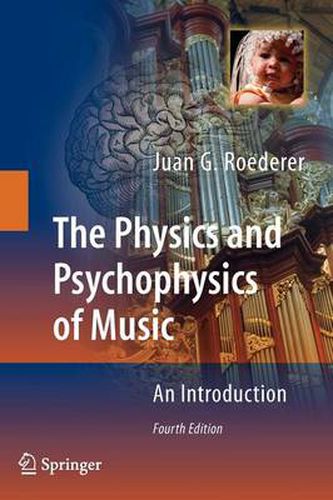Readings Newsletter
Become a Readings Member to make your shopping experience even easier.
Sign in or sign up for free!
You’re not far away from qualifying for FREE standard shipping within Australia
You’ve qualified for FREE standard shipping within Australia
The cart is loading…






This title is printed to order. This book may have been self-published. If so, we cannot guarantee the quality of the content. In the main most books will have gone through the editing process however some may not. We therefore suggest that you be aware of this before ordering this book. If in doubt check either the author or publisher’s details as we are unable to accept any returns unless they are faulty. Please contact us if you have any questions.
This introductory text deals with the physical systems and biological processes that intervene in what we broadly call music.
We shall analyze what obj- tive, physical properties of sound patterns are associated with what subjective, psychological sensations of music. We shall describe how these sound patterns are actually produced in musical instruments, how they propagate through the environment, and how they are detected by the ear and interpreted in the brain. We shall do all this by using the physicist’s language and his method of thought and analysis-without, however, using complicated mathematics. Although no previous knowledge of physics, physiology, and neurobiology is required, it is assumedthatthereaderpossesseshigh-schooleducationandisfamiliarwithbasic aspects of music, in particular with musical notation, scales and intervals, musical instruments and typical musical sensations.
Books are readily available on the fundamentals of physics of music (e. g. , Benade, 1990; Pierce, 1983; Fletcher and Rossing, 1998; Johnston, 2003) and psychoacoustics, music psychology and perception (e. g. , Plomp, 1976; Deutsch, 1982a; Zatorre and Peretz, 2001; Hartmann, 2005). An excellent text on musical acoustics is that of Sundberg (1991), still most useful 17 years later; comp- hensive discussions of recent researches on pitch perception and related au- tory mechanisms can be found in Plack et al. (2005). The purpose of the present volume is not to duplicate but to synthesize and complement existing literature.
$9.00 standard shipping within Australia
FREE standard shipping within Australia for orders over $100.00
Express & International shipping calculated at checkout
This title is printed to order. This book may have been self-published. If so, we cannot guarantee the quality of the content. In the main most books will have gone through the editing process however some may not. We therefore suggest that you be aware of this before ordering this book. If in doubt check either the author or publisher’s details as we are unable to accept any returns unless they are faulty. Please contact us if you have any questions.
This introductory text deals with the physical systems and biological processes that intervene in what we broadly call music.
We shall analyze what obj- tive, physical properties of sound patterns are associated with what subjective, psychological sensations of music. We shall describe how these sound patterns are actually produced in musical instruments, how they propagate through the environment, and how they are detected by the ear and interpreted in the brain. We shall do all this by using the physicist’s language and his method of thought and analysis-without, however, using complicated mathematics. Although no previous knowledge of physics, physiology, and neurobiology is required, it is assumedthatthereaderpossesseshigh-schooleducationandisfamiliarwithbasic aspects of music, in particular with musical notation, scales and intervals, musical instruments and typical musical sensations.
Books are readily available on the fundamentals of physics of music (e. g. , Benade, 1990; Pierce, 1983; Fletcher and Rossing, 1998; Johnston, 2003) and psychoacoustics, music psychology and perception (e. g. , Plomp, 1976; Deutsch, 1982a; Zatorre and Peretz, 2001; Hartmann, 2005). An excellent text on musical acoustics is that of Sundberg (1991), still most useful 17 years later; comp- hensive discussions of recent researches on pitch perception and related au- tory mechanisms can be found in Plack et al. (2005). The purpose of the present volume is not to duplicate but to synthesize and complement existing literature.